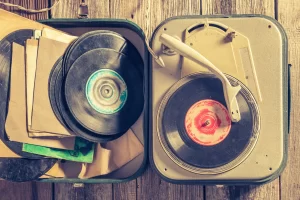The most significant source of revenue for any musician is live shows, but that money can easily be eaten up by travel costs, equipment fees, or, as we’ve seen in the past years: a global pandemic.
It’s crystal clear now more than ever that musicians have to find their way of earning a living. And the only sustainable one is to sell your music online.
Let’s face it, the cd industry is all but dead, and streaming is now the dominant way people consume music.
So how do you go about selling your music online? This article will discuss several ways to get your music out there and start generating some revenue.
Where to sell your music
Let’s start with the basics: where to sell your music. Many possible venues are tried and true. Each of them has its own advantages and disadvantages, so it’s crucial to weigh your options before making a decision.
1. Your own website
Selling your art on your artist’s website is the most fundamental way to sell your music online. You simply create a page on your website that links to download or buy your music. This method has the advantage of being totally under your control and costs nothing to set up.
However, you can’t expect too much traffic on your website from the jump, and there’s no guarantee that people will purchase your music even if they visit the site.
Pros:
● An authentic way to sell your music online
● Little to no costs involved
● Remain in control
Cons:
● It takes a while for traffic to build-up
● No support from major platforms
2. Digital stores/music marketplaces
Major digital stores like iTunes, Amazon, Google Play are among the most common places to shop for digital music. In order to get your music in stores, you’ll need to team up with a digital distribution company like Novecore, and they’ll handle most of the technical stuff for you. This is a really great option if you want a quick and easy way to sell your music online.
To decide between digital stores, you’ll need to consider a few things: do you want your music to be exclusive to one store? How much commission will the store take? What features does the store offer (e.g., streaming, merchandising)?
Pros:
● Your music will be available to a large audience
● The stores have built-in marketing features
Cons:
● Limited control over the look & feel of the store page, which means you can’t brand your music with your colors and logo.
● You have to sign a contract with each store where you want to sell music.
3. Streaming services
With over 100M users, the subscription-based streaming platform Spotify has revolutionized how we listen and buy music. Nowadays, it’s more common for artists to release their new albums exclusively on these platforms because they bring in money while giving fans access to exclusive content, all with a few taps.
Since 2019, Spotify no longer allows artists to upload directly to their platform; to upload music to Spotify, you’ll once again need the services of a digital distribution company. If you’re wondering how to get your music on Apple Music, it’s similar to how you upload to Spotify, with a few minor differences in the application process.
You get paid a fraction of a cent each time someone listens to your song with streaming services. However, if your song is played a lot (think The Weeknd), that can add up to a healthy sum over time.
Pros:
● The most popular avenue for Gen-Z and Millennials
● Generates revenue while fans listen
● Offers exclusive content and collaborations
Cons:
● Crowded market and tough competition, so it’s easy to get lost in the shuffle.
How To Sell Your Music Online
Now that you know a few different places to sell your music, it’s important to understand how to make the most out of each one. If you think the hard work stops once you exit the studio, you’re in for a rude awakening.
1. Treat your music like a business
When you’re starting out, it’s essential to think of your music as a startup business venture. This means treating your art with the same level of seriousness that you would a day job. Make a plan and set realistic goals for yourself, then work diligently to achieve them.
Strategizing is the first step to getting your music out there. Make a plan that outlines how you’ll grow your audience, what steps you need to take to get the results you want, and who will be responsible for doing what. Here are some examples of actions you can put on your to-do list:
● Finish an EP or album and release it online
● Start a blog and write weekly posts
● Upload new music to streaming services every week
● Submit your music to digital stores and marketplaces
● Collaborate with other artists
● Create Music Videos
● Host live shows
● Flesh out your social media strategy
2. Secure money flow
Knowing how to manage your money, or having somebody keep a tab on your finances, is essential to a successful music career. Keep track of your expenses and make sure you’re getting paid for your music.
It’s no secret that you need money to get your music career off the ground, and it’s understandable if you don’t have all of it.
There are plenty of people who want to help you get paid when your music is distributed online, so be sure to choose wisely and secure a deal that benefits you. If you don’t know where to start, try these three ways artists can make money.
Crowdfunding: When fans support your work, you can offer additional incentives like a signed CD or private performance.
Merchandise: Selling merch is a great way to make some extra cash while giving your die-hard fans an object of desire.
Licensing: Take advantage of the opportunities that come from licensing your music out for use in videos, ads, and more.
3. Build anticipation
One of the most important aspects of selling music is creating a sense of anticipation before the release. This can be done in various ways, but social media is a great place to start. Share snippets of your work in progress, give insights into the creative process, and connect with fans who are excited to hear your new music.
When you’re gearing up for a release, be sure to send out a press release to music writers and bloggers. If they’re interested in what you’re doing, they might write about it and give you some extra exposure.
Creating a website or landing page is another way to build anticipation. It’s where you can start building your brand, so it’s important to design something that feels professional and looks sharp.
4. Get feedback
Getting feedback on your music is essential if you want to improve as an artist. Collaborate with other artists, and ask them to give you constructive feedback. This will help you grow and give you an idea of how well the public likes your work.
You can also use services like SoundCloud, Bandcamp, or ReverbNation to get feedback from fans and followers. These platforms also help you connect with people who might be interested in your music.
And it doesn’t stop at the music! Use Youtube and VEVO to promote your music videos and understand what you can do to improve the viewership of your videos.
5. Interact with your fans
A primordial aspect of the music industry is to connect with your fans and keep them updated on what you’re doing. This can be done through social media, email newsletters, or even in person.
Fans who feel connected to the artist are more likely to buy music and merchandise, so make sure you take the time to interact with them. Thank them for their support, answer their questions, and give them a glimpse into your life as an artist.
It’s also a good idea to create exclusive content for your biggest fans. This could be anything from backstage footage to remixes or demos of your songs, or as mentioned below, NFTs.
Capsule From The Future: NFTs in Music
At some point in the future, we will likely see considerably more music being sold and traded using non-fungible tokens (NFTs). An NFT is a unique digital asset that cannot be replicated. This would mean that if you owned a copy of an artist’s song, you would be the only person who could listen to it.
The use of NFTs in the music industry would provide many benefits, including:
● Eliminating piracy and copyright infringement
● Preventing unauthorized sharing of music files
● Allowing artists to sell their music directly to fans
● Providing a secure and transparent system for tracking sales and royalties
● Allowing for paid subscription services
● Establishing a marketplace to exchange music and other media tokens
While it’s not necessary to publish works as NFTs yet, it’s a good idea to familiarize yourself with the concept and keep an eye on its development. The music industry is constantly changing, and it’s important to stay ahead of the curve.
Can You Benefit From The Services Of A Music Distribution Company?
If you’re reading this blog post thinking that selling music online is more than a one-person job, you’re right! Many companies can help artists get their music online. And it’s no small task to monetize a single song on Spotify, Apple Music, Deezer, YouTube Music, and even Soundcloud while ensuring your royalties are paid correctly. After all, that’s what we do here at Novecore.
Get your songs in the hands of a company that knows how to navigate the music industry and can help you reach your fans. As an artist, you should be focused on what you do best — making music. Leave the publishing and distribution to a company with the experience necessary to make it happen.
We can ensure your songs are distributed on all major platforms, even if they change their policies. With us as your distribution partner, you’ll always have an advocate ensuring distribution stays in place at no extra cost to you.
How much does it cost to distribute my music?
There is no cost to distribute your music with Novecore. We work on a commission basis, so you only pay when we make sales for you. You can sign up for Novecore Premium for $5 per month if you want same-day distribution or chart and music monitoring. A small price to pay for peace of mind and getting your music heard by the right people.
Final Thoughts
Selling your music online has become the norm in the digital era. You have many options for distribution, and it’s important to choose the exemplary service for you. Partnering with a music distribution company can help ensure your music is heard by the right people, at the right time, and in the right way.
If you’re looking for fast, easy, and free music distribution, look no further than Novecore. With over a decade of experience in the music industry, we can help you get your music where it needs to be. Get started today by creating an account with us!




